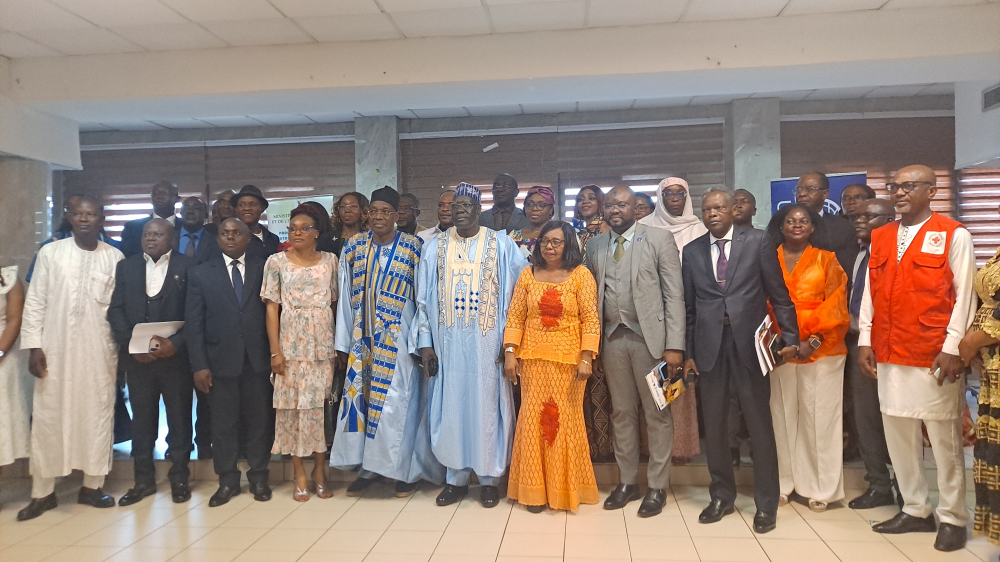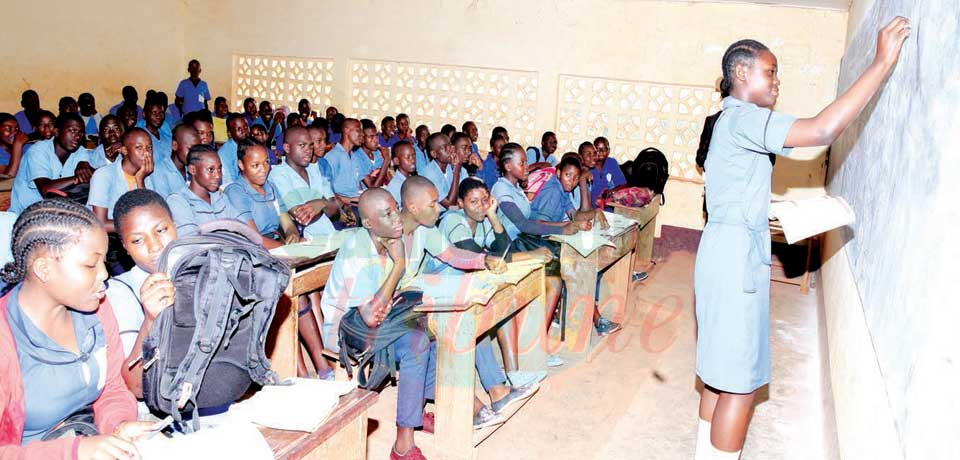Personality Profile: The Dream That - Eventually - Came To Pass
- Par Kimeng Hilton
- 18 déc. 2024 17:36
- 0 Likes

After 16 years of toilsome studies, Dr Nene Ahidjo on November 27, 2024 defended a PhD in Neuropharmacology. Fulfilling her childhood dream of becoming a neuroscientist. Her thesis was on the use of Bitter Kola to treat brain disease.
She is no doubt a fulfilled lady. Though still in the early years of her career. Because she is already pharmacist, neuroscientist and a neuropharmacologist. With three degrees. A Doctorate in Pharmacy (DPharm), a Master’s in Neuroscience (MSc Neuroscience) and only recently, a Doctor of Philosophy degree (PhD) in Neuropharmacology. All from the Faculty of Medicine and Biomedical Sciences, FMBS of the University of Yaounde 1. In addition to being an Assistant Lecturer in the Department of Pharmacotoxicology and Pharmacokinetics of the same faculty. As well as being the Pharmacist of Nkolbisson District Hospital in Yaounde.
Childhood Dream
“In high school, I had a dream of one day becoming a medical doctor,” recalls Dr Nene Ahidjo. A mother of three who is married to Colonel Dr. Njitung Caleb. On November 27, 2024, she defended a PhD in Neuropharmacology in the Faculty of Medicine and Biomedical Sciences of the University of Yaounde I. Marking the culmination of a long journey to realizing a dream that began way back in 2008.
Early Mentoring
“I was still in Lower Sixth in Government Bilingual High School, Essos, GBHS, Yaounde. Under the distinguished patronage of the Head of State, President Paul Biya, the Pan-African Association of Neurological Sciences, PAANS, congress held in Cameroon under the leadership of Prof. Alfred K. Njamnshi. The Scientific Committee of the Congress invited best primary school, high school and undergraduate university students to a neuroscience competition. And I was blessed to be part of it,” the 33-year-old, who hails from Mbere Division in Adamawa Region.
So enriching was the experience that Nene “passionately fell in love with neuroscience. This was the turning point in my life. I promised myself to one day become like Prof. Alfred K. Njamnshi in the field of Neurology/++.”
Medical School, Here I Come!
In 2009 after succeeding in the General Certificate of Education, GCE Advanced Level examination, Nene sat the entrance examination into the Faculty of Medicine and Biomedical Science of the University of Yaounde 1 with General Medicine as her first choice. Hoping to specialize later as a neurologist. But it was not – initially - to be. “I did make it into the faculty, but was admitted into pharmacy, which was my second choice. I was rather disappointed, convinced that my dream was never going to come true. However, and fortunately for me, in the middle of second semester in level 1, I ran into Prof. Njamnshi on the campus,” Nene recounts.
Back On Track
Expectedly, the Professor was glad that the young student he had earlier mentioned in high school finally made it to medical school. “More importantly, he put my dream back on track when he explained to me that I could become a neuroscientist with a doctorate degree in pharmacy,” Ahidjo says. Throughout her studies in pharmacy, Prof. Njamnshi encouraged her and became her mentor. Hence, in 2016, she defended her DPharm, working on the protective properties of G. kola (commonly known as ‘Bitter kola”) on rat brains that were exposed to dangerous radiation.
Bitter Kola’s Neuroprotective Potential
This was the first in-vivo study of the neuroprotective potential of the extracts of this nut. The research topic was given her by her thesis director, Prof. Njamnshi. Before then, all work on Bitter Kola extract was out of a living organism (in-vitro). The following year, in 2017, Nene obtained her MSc in Neuroscience, furthering work on how long this protective effect could last, still under Prof. Njamnshi as main thesis director.
From The Beginning, To The End
“When I was in the fourth year of pharmacy studies, Prof. Njamnshi called me into his office and gave me several articles by Nigerian scientists related to brain pathology and Garcinia kola (bitter kola). He asked me to carefully and critically read them, bring out knowledge gaps and propose novel research questions that could lead to new answers and solutions to the issues around protecting the brain from injury.
Multi-disciplinary Approach
“I found this approach and research project very interesting especially considering that this is a medicinal plant that is consumed widely in Cameroon. It was not an easy task for me to accomplish, given that I still had to complete my normal pharmacy courses. Furthermore, as we refined the research questions and hypotheses, it became clear that we needed expertise in organic chemistry. That is how my supervisor approached Prof. Bonaventure T. Ngadjui, whose support as co-director was tremendous.
“We had to use an infectious model of neurodegeneration for my PhD work. My mentor brought in one of his former PhD students and now junior colleague, Prof. Paul Faustin Seke Etet. He introduced me to neuro-histological methods, stereology, in addition to the experimental neurocognitive skills I had already acquired. We needed all these different methods and a multidisciplinary approach to answer the basic questions of whether malnutrition or menopause could influence (accelerate) cerebral toxoplasmosis. And if extracts of G. kola could mitigate these alterations, and what groups of substances were responsible for this effect if we could confirm it,” Nene narrates.
Research Findings
After years of toilsome work, the findings of the PhD research revealed the following: That a low-protein diet can result in the development of an accelerated form of neurotoxoplasmosis, an opportunistic disease caused by Toxoplasma gondii parasite, in infected non-susceptible immunocompetent animals. Normally in these animals, the infection should have caused an asymptomatic disease. Thus, protein malnutrition could be one of the factors in the worldwide increase in the occurrence of severe forms of cerebral toxoplasmosis in immunocompetent subjects, which has been poorly understood until now.
That treatment with G. kola (bitter kola) extracts prevented the appearance of signs of neurotoxoplasmosis in animals infected with T. gondii and fed on a low-protein diet, including alterations in physiological parameters, organ lesions, decline in cognitive and motor functions, and neuronal loss in the brain. These effects were achieved through antiparasitic, anti-inflammatory, and neuroprotective properties likely mediated by secondary metabolites of the flavonoid and tannin families. In simple language, bitter kola could become a treatment for severe forms of toxoplasmosis!
In addition, unlike conventional drugs that act only on the active form (tachyzoites) of T. gondii, G. kola (bitter kola) extracts have also shown positive (destructive) effects against the encysted form (bradyzoites), leading to a complete eradication of tachyzoites and cysts both in the blood and in tissues. It is well established that cysts are the reason for disease recurrence after treatment with conventional drugs in susceptib...
Cet article complet est réservé aux abonnés
Déjà abonné ? Identifiez-vous >
Accédez en illimité à Cameroon Tribune Digital à partir de 26250 FCFA
Je M'abonne1 minute suffit pour vous abonner à Cameroon Tribune Digital !
- Votre numéro spécial cameroon-tribune en version numérique
- Des encarts
- Des appels d'offres exclusives
- D'avant-première (accès 24h avant la publication)
- Des éditions consultables sur tous supports (smartphone, tablettes, PC)
Reactions
De la meme catégorie
Checkmating Irregular Migration : New Project Targets Over 1.5 Million Youth
- 07 janv. 2025 14:13
- 0 likes














Commentaires